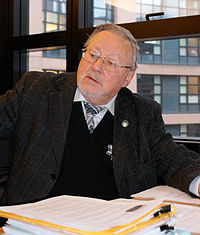- Prager Erklärung
-
 Erstunterzeichner Václav Havel
Erstunterzeichner Václav Havel
 Erstunterzeichner Joachim Gauck
Erstunterzeichner Joachim Gauck Erstunterzeichner Vytautas Landsbergis
Erstunterzeichner Vytautas Landsbergis
Die Prager Erklärung zum Gewissen Europas und zum Kommunismus (engl. Prague Declaration on European Conscience and Communism) wurde am 3. Juni 2008 von mehreren prominenten europäischen Politikern, ehemaligen politischen Häftlingen und Historikern unterzeichnet. Die Erklärung forderte die Verurteilung von kommunistischen Verbrechen. Sie schloss die internationale Konferenz „Europas Gewissen und der Kommunismus“ im Tschechischen Senat in Prag ab. Die Konferenz wurde vom Senatsausschuss für Bildung, Wissenschaft, Kultur, Menschenrechte und Petitionen, unter der Schirmherrschaft von Alexandr Vondra, stellvertretender Ministerpräsident der Tschechischen Republik für europäische Angelegenheiten, organisiert[1][2] Die Konferenz erhielt Briefe der Unterstützung von Präsident Nicolas Sarkozy, Lady Margaret Thatcher, Jason Kenney und Zbigniew Brzezinski.
Die Erklärung forderte die Ausrufung des 23. August als Europäischer Tag des Gedenkens an die Opfer von Stalinismus und Nationalsozialismus. Der Gedenktag wurde am 2. April 2009 vom Europäischen Parlament ausgerufen.[3]
Die Erklärung forderte weiter:
- "reaching an all-European understanding that both the Nazi and Communist totalitarian regimes each to be judged by their own terrible merits to be destructive in their policies of systematically applying extreme forms of terror, suppressing all civic and human liberties, starting aggressive wars and, as an inseparable part of their ideologies, exterminating and deporting whole nations and groups of population; and that as such they should be considered to be the main disasters, which blighted the 20th century"
- "recognition that many crimes committed in the name of Communism should be assessed as crimes against humanity serving as a warning for future generations, in the same way Nazi crimes were assessed by the Nuremberg Tribunal"
- "introduction of legislation that would enable courts of law to judge and sentence perpetrators of Communist crimes and to compensate victims of Communism"
- "ensuring the principle of equal treatment and non-discrimination of victims of all the totalitarian regimes"
- "European and international pressure for effective condemnation of the past Communist crimes and for efficient fight against ongoing Communist crimes"
- "recognition of Communism as an integral and horrific part of Europe’s common history"
- "establishment of an Institute of European Memory and Conscience"
- "adjustment and overhaul of European history textbooks so that children could learn and be warned about Communism and its crimes in the same way as they have been taught to assess the Nazi crimes"
- "the all-European extensive and thorough debate of Communist history and legacy"
- "joint commemoration of next year’s 20th anniversary of the fall of the Berlin Wall, the massacre in Tiananmen Square and the killings in Romania"[4]
Erstunterzeichner
- Václav Havel
- Joachim Gauck
- Göran Lindblad
- Vytautas Landsbergis
- Jiří Liška
- Martin Mejstřík
- Emanuelis Zingeris
- Ivonka Survilla
- Łukasz Kamiński
- Jana Hybášková
- Christopher Beazley
- Tunne Kelam
- Martin Mejstřík
- Jaromír Štětina
- Emanuelis Zingeris
- Tseten Samdup Chhoekyapa
- Ivonka Survilla
- Zyanon Paznyak
- Růžena Krásná
- Jiří Stránský
- Václav Vaško
- Alexandr Podrabinek
- Pavel Žáček
- Miroslav Lehký
- Łukasz Kamiński
- Michael Kißener
- Eduard Stehlík
- Karel Straka
- Jaroslav Hutka
- Lukáš Pachta
Einzelnachweise
- ↑ http://www.radio.cz/de/nachrichten/104577
- ↑ http://www.praguedeclaration.org/
- ↑ http://www.europarl.europa.eu/sides/getDoc.do?pubRef=-//EP//TEXT+TA+P6-TA-2009-0213+0+DOC+XML+V0//DE
- ↑ Prague Declaration – Declaration Text (3 June 2008). Abgerufen am 28 January 2010.
Siehe auch
Kategorien:- Aufarbeitung der kommunistischen Gewaltherrschaft
- Prag
- Politik 2008
Wikimedia Foundation.

